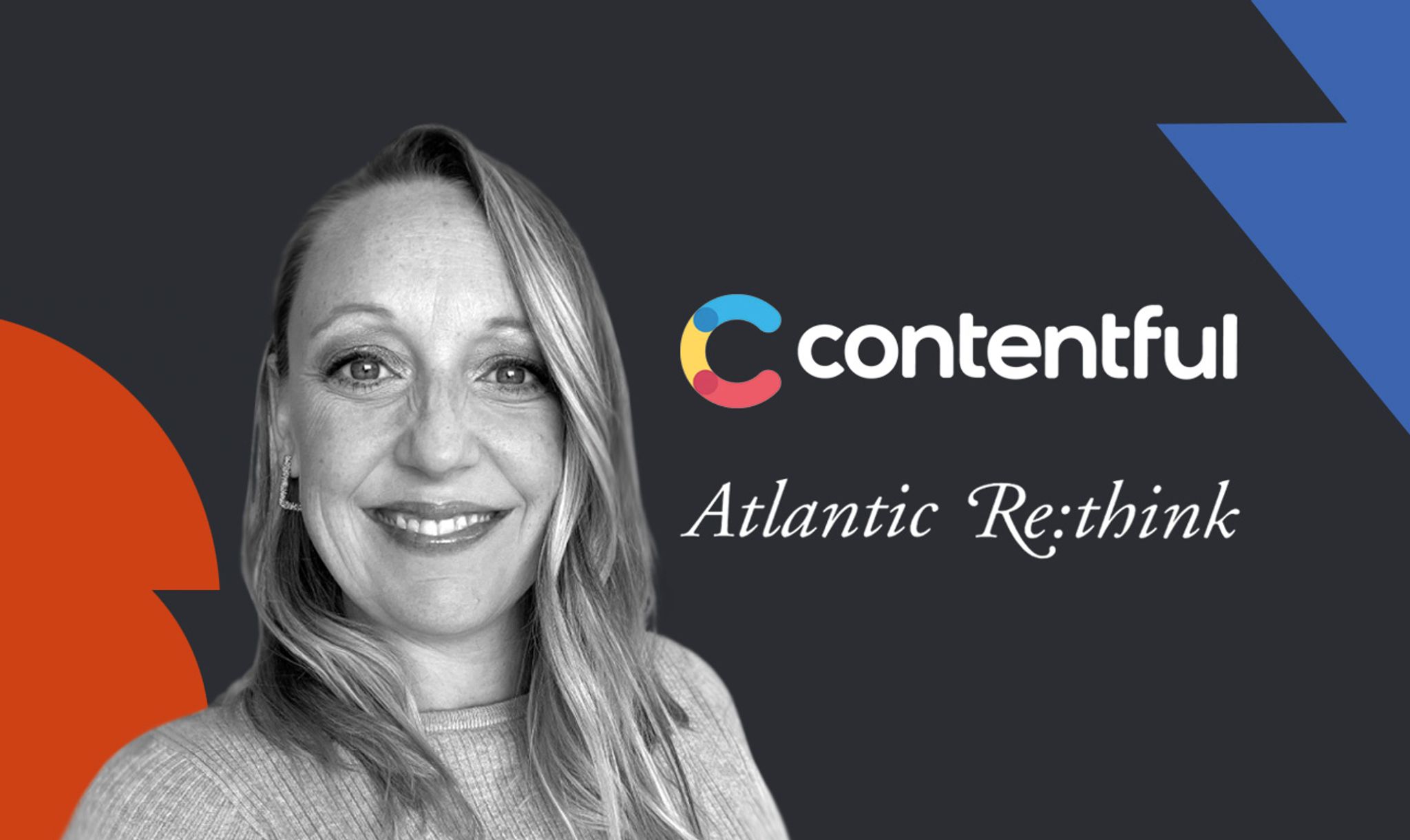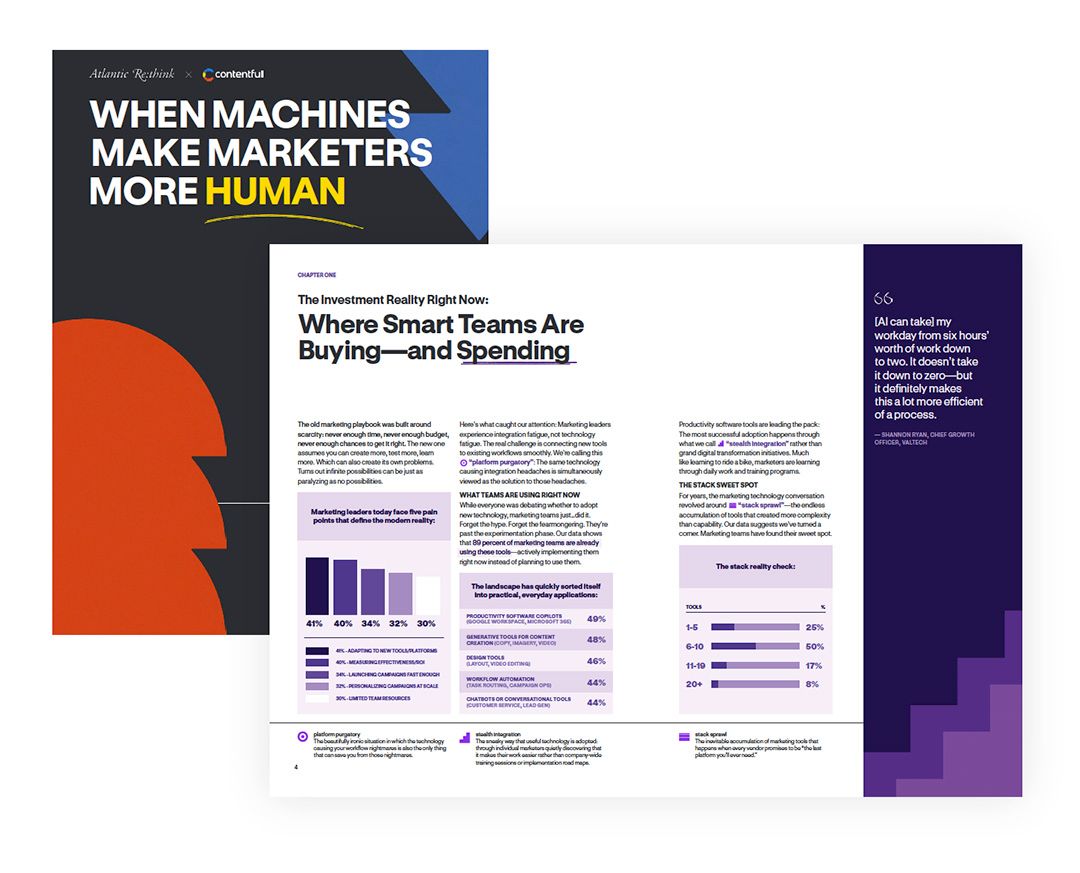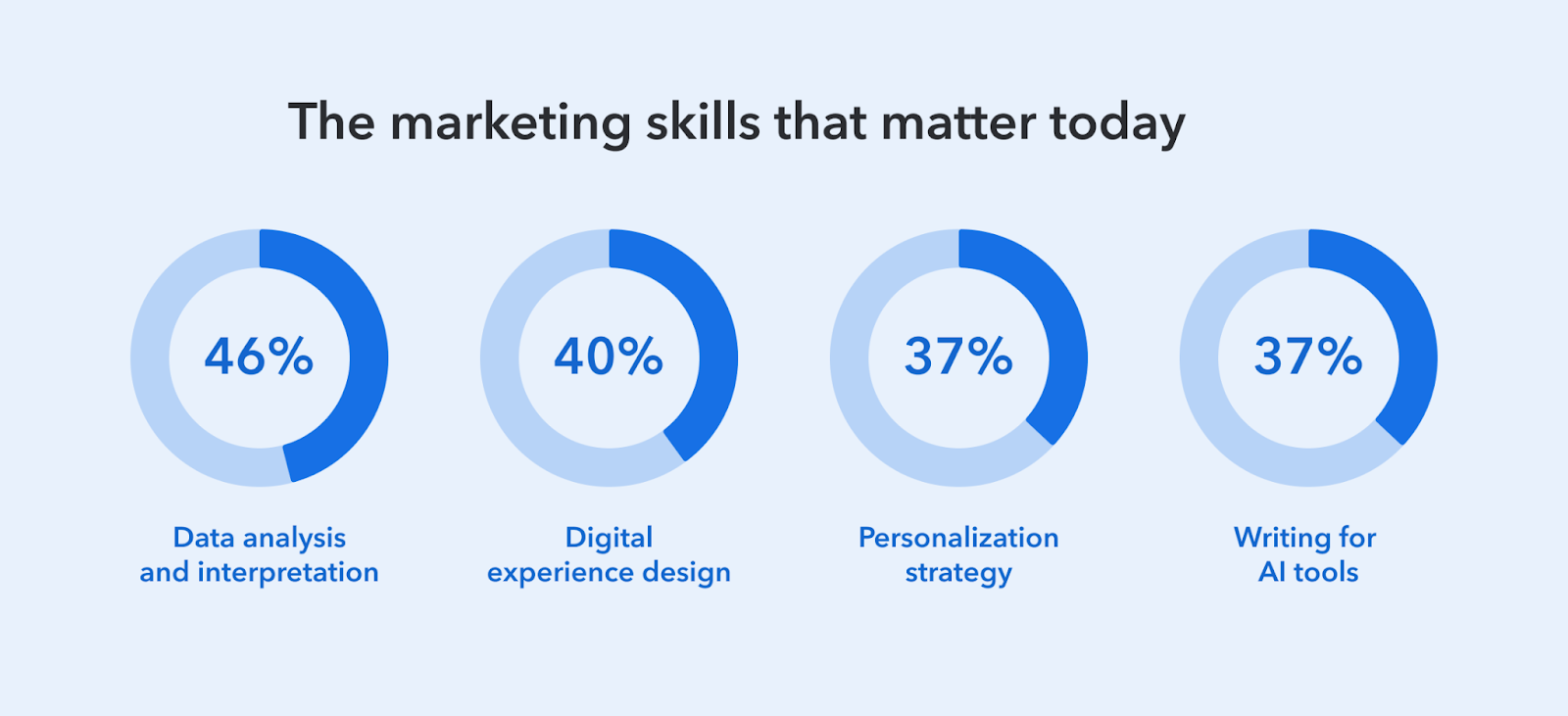Is ‘evidence-based creativity’ the must-have marketing skill for the age of AI? Contentful’s research says yes

The DXP collaborated with Atlantic Re:think on a global study that reveals how AI is amplifying the effectiveness, creativity, and impact for modern marketers. Interview with CMO Elizabeth Maxson.
I’m a sucker for anything Gordon Ramsey. Literally. Just bake his name into a show title, and I’m streaming it.
Maybe it’s my compulsion to cook everything with a cast-iron skillet that draws me to shows like Master Chef. I love elevated cooking, but I really love watching people create glorious dishes out of thin air and suffer the wrath of a fiery judge.
There’s a new entry in the pantheon of “Ramsey couture” called Next Level Chef, and it pits talent against resources. Participants compete in a multi-level kitchen, where the top floor is decked out with Viking ranges and HexClad cookware.
The basement, on the other hand, has the equivalent of an Easy-Bake oven and a few wooden spoons. It's a step above sticks and stones. And yet, a talented chef stuck on the bottom floor can sometimes foil the cooks above. Because even with mediocre tools, real talent shines through.
The same is true for marketers in this age of dense stacks and AI-powered everything. We can lean on all the best utensils or accoutrements, but a mediocre marketer isn’t as effective as a brilliant one – and having infinite AI-generated choices can be more hurtful than helpful if you don’t have smart people managing the kitchen line.
We no longer have to choose between human intuition and technological wizardry. The best performing and most creative results come from intelligent, cogent thinkers who are supported by the best tools possible – and today, that means AI.
In other words, pairing a master chef with a Wüsthof blade can cut with Michelin-star results.
That’s the locus of some newly published research from Contentful in collaboration with Atlantic Re:think (the marketing research division of The Atlantic). It’s called When Machines Make Marketers More Human, and it posits that AI isn’t replacing people – but is, in fact, making them more human.
The research, delivered in a visually impactful eBook, is packed with substance but easy to process. Written with marketers in mind (and clearly at its heart), the text is delightfully crafted, making the charts and numbers much more accessible. There’s a lot in here, but I read the entire report over lunch and found it enlightening yet practical in its conclusions and actionable recommendations.

And those charts and numbers are indeed compelling. What they point to is the rise of “evidence-based creativity,” where marketers generate breakthrough ideas while validating and optimizing them through data (more on that in a bit).
This new paradigm gives marketers more power and insight than before. It also challenges the doomsdayers who suggest AI will simply replace marketing roles and functions – and instead focuses on how AI can amplify a marketer’s effectiveness, creativity, and overall impact.
I recently spoke to Elizabeth Maxson, Contentful’s Chief Marketing Officer (which she suggested is more of a “Chief Market Officer” role), about the report. She had just returned from an industry leadership conference, where her cohorts – like her – have been swimming in an expanding sea of martech tools.
“I was with 100 CMOs for the week, and everyone's saying, ‘What tools are you using? What tools for this, what tools for that?’” she said, laughing at the abject futility. “The tools are changing so fast, so it's hard to keep up. It's hard to even know which ones are better."
Making sense of the “toolscape” is indeed part of the problem. Last week, I spoke to an IT leader in our industry, and he was stunned at the number of apps his marketing counterparts rely on. He was thankful to just have Visual Studio and GitHub running on his laptop – with maybe a CLI and a notepad to boot.
But Elizabeth sees this moment of dense marketing applications as an opportunity, one where marketers can overcome the concerns of a tool replacing them and embrace the totality of insight. She sees the rise of the “full stack marketer” as an inevitable evolution.
“What we’re finding is that a new generation of marketers is emerging,” she explained. “They have to be fluid in AI workflows. You have to be able to write really strong prompts, but also be able to navigate complex tech stacks that are woven into your daily routines. Many of us are using productivity tools and generating AI for content creation, so it's starting to become more of a natural part of the job.”
Productivity is a central component in AI’s value quotient, and for marketers, the value is abundantly clear. But humans still play an incredibly vital role. Elizabeth illustrated this with an example of a team member who used AI to generate an infamous “logo slide” for a deck. It did it in seconds, but not all the logos were accurate. A human caught the issue, which resulted in a discussion around optimizing the data source back to Salesforce, where approved logos could be harvested.
As she pointed out, it’s just one example of where the marketer’s human insight and intelligence are irreplaceable. This expands well beyond tactical facets and into the layer of creativity that marketers are known for.
“AI can do a lot of things for us, but there are so many different aspects that AI can't do for us, like driving creativity and provoking emotion,” Elizabeth said. “So for me, I’m not fearful at all. I don't believe our jobs are going to be replaced. I think AI is going to help us to be better marketers. That’s not scary. It’s exciting.”
Let’s dig into more of the details from this report – and why it matters.
Driving the future of marketing with ‘evidence-based creativity’
Contentful has long endeared itself to creative professionals. I was a big fan of its “The New Art of Storytelling” campaign from 2023, a short film that accompanied its “Storylines” roadshow. The exquisite documentary-style feature explored the horizon of content in a composable world, offering interviews with thought leaders across the spectrum (and even channeling a little Marshall McLuhan in its omnichannel tributaries).
The emphasis on creators is a powerful part of the narrative, and Contentful has continued to double down on this mantra. Since the film was released, AI has certainly altered the tooling landscape, but marketers still have the same challenging mandate to deliver messages and experiences that break through and convert.
As Elizabeth noted, she has the unique position at Contentful of being a marketer selling to other marketers – and while she’s relatively new to her role (it will be a year next month), she spent a decade at the almighty Salesforce, where she was SVP and CMO for the Tableau product line. All of her rich marketing experience has prepared her for this new frontier of opportunity, with an even deeper emphasis on reaching people in a personalized way.
“Here at Contentful, we think beyond B to B and B to C. It's all about B to H, which is business to human,” she explained. “This goes back to what AI doesn't have, and it's evoking human emotion.”
“Marketers shouldn’t be singularly ‘creative’ or ‘analytical’. They must be both. Data helps us understand what’s working, but creativity is what makes people care.”
At the same time, grabbing someone with an emotional hook can benefit from scientific validation. This mix is shaping Elizabeth’s vector as a marketing leader who sees data-led creativity as a key to unlocking success, and the new report codifies this.
The research, which was synthesized from surveys and interviews with hundreds of senior marketing leaders around the world, reveals just how much the shift to evidence-based creativity is changing the topology for modern marketers. It's a fairly intuitive concept, one where creative professionals use data to inform their ideas instead of defending them with “interpretive dance.”
As the study suggests, data lovers within marketing organizations are becoming the new breed of creative directors, synthesizing what have traditionally been disparate or even diametrically opposed personality traits.
“Marketers shouldn’t be singularly ‘creative’ or ‘analytical’. They must be both,” Elizabeth said. “Data helps us understand what’s working, but creativity is what makes people care.”
Case in point: According to the study, 46% of respondents cited data analysis and interpretation as the top skill needed in the profession today, while 34% of successful marketers are defining success according to strong performance metrics or ROI.
Energizing the marketer’s role with AI
The ability to combine human creativity with AI-driven insights is becoming essential to producing, testing, and scaling ideas with measurable impact. But Contentful’s research also tackles the broader evolution of the marketing skillset.
As previously mentioned, this notion of a new generation of “full-stack marketers” is really taking shape, moving beyond effective prompting into AI-enabled workflows, navigating diverse tech stacks, and embedding AI tools into daily operations.
“There is a growing fear that AI will erase marketing jobs, but that concern is misplaced. The real risk is failing to use AI strategically,” Elizabeth said. “When marketers invest in the right tools that support their teams’ daily work and prioritize marketing talent that blends creativity with analytics, that’s when AI stops being hype and starts delivering meaningful results.”
The survey supports this shift towards real value: 49% of marketers report using both AI copilots in productivity software, and almost the same number are using generative tools for content creation. This data underscores how quickly these tools are becoming part of the day-to-day workflow. When combined with growing expertise in digital experience design, personalization strategy, and governance, these capabilities are telegraphing a seismic shift in the marketing landscape.
Personalization is, of course, one of the key areas where marketers have seen AI as a panacea for their woes, and having a reliable experimentation layer has been key to unlocking this. Contentful nailed down that critical piece in 2024 with the acquisition of Nine Tailed, but creating more volume of multivariant content isn’t necessarily the answer. As Elizabeth trumpeted, it’s all about quality – and that requires human intuition.
“More content doesn't equal better content. Better content equals better content,” she reinforced. “And to get to that quality content, you really have to have that human factor to fuel personalization. For marketers, it’s all about understanding the entire customer life cycle.”
On that note, Contentful is seeing positive results from its personalization. During our call, Elizabeth shared a real-time success story from a customer’s timely LinkedIn post.
“Vodafone just used our personalization tool for their launch today,” she stated. “After going live at 1 pm, we saw the first personalized experience delivered within 30 seconds, and they were using the personalized homepage to actually deliver more relevant offers and products.”
The evolution of the “data-savvy creative”
As I said, this is an easy-to-navigate eBook that’s well-organized and, quite frankly, brings some creative charm to what could have been dry, mundane data points. I recommend exploring the nuance, but it’s also delivered as a PDF – and Acrobat offers its own built-in AI for summarizing content.
One thing I liked was how the report distilled the major pain points that define the modern marketer’s reality: adapting to new tools, measuring effectiveness, launching campaigns fast enough, personalizing them, and doing it all with limited resources.
While the old paradigm of marketing was all about scarcity, the new one assumes more of everything – from testing to learning to creation. As the study postulates, infinite possibilities can be just as paralyzing as no possibilities.
The study brings the reality of modern methods into sharp relief. Many marketers are indeed trapped in “platform purgatory” but are using stealth integration to get out of it – adopting technologies that work for them but aren’t sanctioned company-wide. This is a phenomenon I frequently encounter when talking to enterprise customers.

Contentful’s research identified the top four marketing skills that matter today. Source: Contentful
As evidence-based creativity gives rise to the “data-savvy creative,” practitioners and organizations are investing to reach the peak of performance. Along with the rise in skillsets like data analysis and interpretation, survey respondents indicated that digital experience design (40%), personalization strategy (37%), and writing for AI tools (37%) were also critical.
Meanwhile, 33% of marketers rank campaign testing and optimization as a top skill — reflecting a shift toward data-informed creative instincts. Additionally, 45% of organizations are already offering AI training, a clear marker of organizational maturity.
Bridging the “optimism-execution gap”
The growing AI anxieties around security, privacy, cost, and lack of training are surfacing as what the report calls an “optimism-execution gap” – where 96% of CMOs are prioritizing AI adoption, but only 65% of teams are making meaningful investments.
AI investment is unquestionably a priority for marketers, with 74% investing in the technology and 34% allocating at least $500,000 toward AI marketing tools or initiatives over the next 12 to 36 months. Despite that rosy investment picture, two-thirds of marketers say their current marketing technology stack isn’t helping them do more with fewer resources – at least not yet.
While 89% of marketing teams are already using AI tools, a mere 18% of marketers report reduced reliance on developers or IT. Translation? They’re testing with intent but haven’t moved to full deployment.
In other words, the hype is real. But the impact is still very much a work in progress.
The optimism-execution gap reflects the chasm between AI’s potential and reality. As Elizabeth said, there might be a space to straddle, but now is the time – and the opportunity – to close it in a meaningful way.
"I think really this gap is about breaking through and seeing this as an exciting time to be a marketer and embracing the challenge,” she said enthusiastically. “And again, how do you bring in your whole self and your own human creativity to be able to deliver that? Let's go out and test things. Let's go out and see if this works. And if it doesn't work, fail fast and pivot quickly. You know, think big, start small, move fast. That's a great framework to get going, but you have to break through the noise.”
Wrestling with global compliance
If you’re paying attention to the growing chorus surrounding AI controls and legislation, then you already know how uneven the pavement is on a regional scale. As the research indicated, AI's opportunities and challenges differ by region, with Europeans advancing compliance and Americans focusing on rapid experimentation.
In the content management space, we’ve already seen some heady regulatory action in the EU surrounding open source technologies with the Cyber Resilience Act. Now, with a similarly sweeping EU Artificial Intelligence Act in the pipeline, EMEA marketers are proactively adopting a methodical, compliance-ready approach, with 58% selectively testing AI tools under a defined plan, while 32% are emphasizing governance skills such as brand voice, compliance, and quality standards.
On the opposite end of the spectrum, U.S. marketers are emphasizing experimentation and rapid testing, with 37% focusing on campaign optimization versus 26% in EMEA. According to the research, 45% of U.S. teams measure success via high content quality and 39% by flexibility, while 43% of EMEA teams lean toward operational excellence and speed.
The differences are clear, and based on the political lines currently drawn, it’s unlikely that any uniform policies will emerge. As such, marketers with global interests will have to juggle a diverse landscape relative to their AI initiatives.
Why it matters
Gordon Ramsey is famous for being blunt. He tells the sobering truth, regardless of how painful it might be. But he does it with the intention of helping the chefs under his purview to enhance their skills and become kitchen ninjas in high-pressure situations.
CMOs are chefs in their own right. They’re tasked with creating demand in a noisy marketplace of choice, delivering unique experiences, and keeping customers happy. And they’re doing it with an evolving menu of tools that don’t always meet gastronomic expectations. That’s why having the right approach to testing and experimenting is a critical ingredient.
Contentful’s research provides more than a snapshot of what’s happening in the CMO’s kitchen. It underscores the evolutionary impact of AI on a marketer’s potential. It also provides strong recommendations for professionals to improve their data fluency and embrace more systematic planned implementations versus ad hoc testing. For enterprises, there’s also some keen advice around hiring “AI Orchestrators” over strategists – people who bring the last mile of brilliant choices to a set of AI-generated suggestions.
One thing I really loved about this research document was the persona spotlights on roles like campaign architects and DX strategists. These vignettes provide a vivid pastiche of the pressures these stakeholders face in an evolving landscape, and prescribe a path forward driven by data. These spotlights enrich the delivery and make the content more relevant and relatable to specific roles.
I was also keen on the “Investment Playbook” chapter, which offers insights for mapping tools to specific business outcomes such as speed, quality, and personalization. There’s a nifty table that’s designed to help you allocate your budget proportionally based on the aforementioned factors, which could use a bit more context – but certainly works at a very high level.
What’s missing? Perhaps a little more specificity from the survey participants. There were just a few examples peppered throughout. For example, a marketing manager replied that cost (or cost reduction) is a barrier and new tech is expensive. That’s a fairly predictable observation, and I’d love to read more of what respondents actually said based on their industry category and role.
Perhaps the most valuable takeaway from this research is the empowerment of the marketer in the age of AI. There’s plenty of doom and gloom from the likes of Anthropic’s CEO Dario Amodei, who recently suggested that AI could eliminate up to 50% of all entry-level white-collar jobs within the next five years. Add to that an uneven policy landscape and broad economic concerns, and there’s a lot of uncertainty ahead.
All that aside, the areas of focus in this research (and the numbers) reflect a growing enthusiasm around the potential of AI to help marketers become more prolific – and leverage evidence-based creativity to reach new levels of automation and performance.
Orchestrating all of this is the CMO, who can be the chief activator for success. And despite the dearth of apps and the scaling complexity, these human leaders will provide the most important insight and guidance for brands in the age of AI.
“I think this is the best time to be a marketer,” Elizabeth beamed.
Heard, chef. If you’re ready to get cookin’, you can read the full report here.
Looking for guidance on Contentful? Talk to an expert.
Upcoming Events

Storyblok JoyConf 2025
October 14-15, 2025 – Amsterdam, Netherlands
November 4, 2025 – New York, NY
November 6, 2025 – Los Angeles, CA
Join us at JoyConf 2025, where the future of content meets the people shaping it. Built for developers, marketers, and digital innovators, this free conference goes way beyond product updates or yet another strategy playbook. It’s where you’ll get inspired, get real, and get connected – to ideas, to the community, and to what’s possible when you build joyfully. Whether you're building lightning-fast frontends or launching cross-channel campaigns, this is where content becomes connection and collaboration becomes second nature. Come for the talks. Stay for the community. Leave with joy. Save your spot.

Sitecore Symposium 2025
November 3-5, 2025 – Orlando, FL
At Sitecore Symposium, you’ll learn how to meet your customers where they are – across channels, moments, and touchpoints that didn’t exist a year ago. You’ll hear how the boldest brands in the world are transforming content into outcomes and creating experiences that are fast, relevant, and human. Join 1,500 marketers, digital leaders, and technologists in Orlando to see what’s possible when personalization scales, AI accelerates creativity, and trust becomes your competitive edge. This is the Third Wave of the Internet. And this is your moment to lead in it. Get your tickets today.

CMS Kickoff 2026
January 13-14, 2026 – St. Petersburg, FL
Meet industry leaders at our fourth annual CMS Kickoff – the industry's premier global CMS event. Similar to a traditional kickoff, we reflect on recent trends and share stories from the frontlines. Additionally, we will delve into the current happenings and shed light on the future. Prepare for an unparalleled in-person CMS conference experience that will equip you to move things forward. This is an exclusive event – space is limited, so secure your tickets today.
